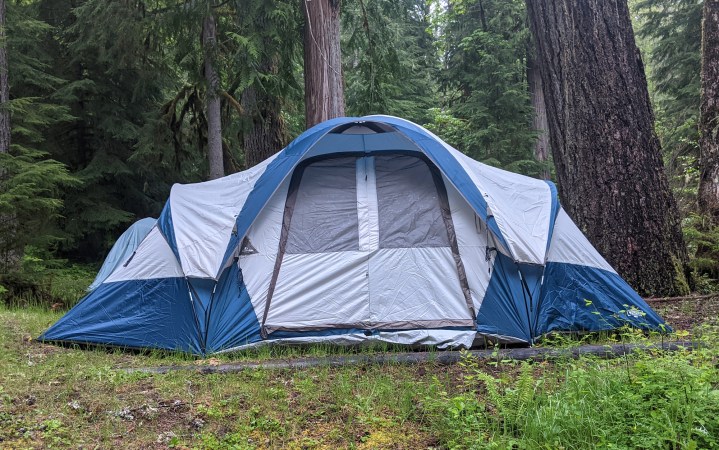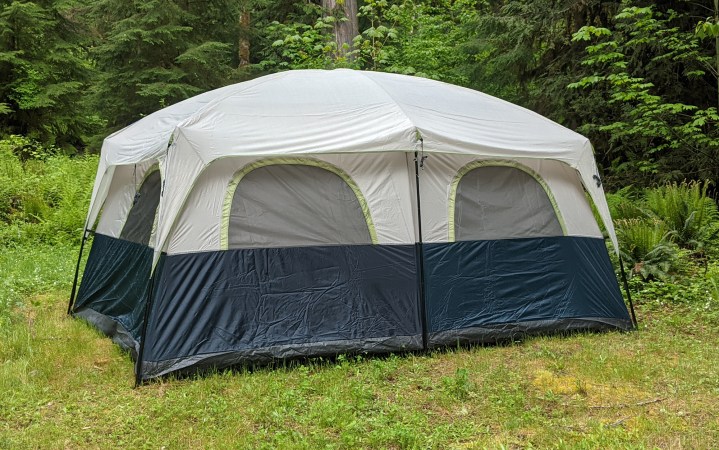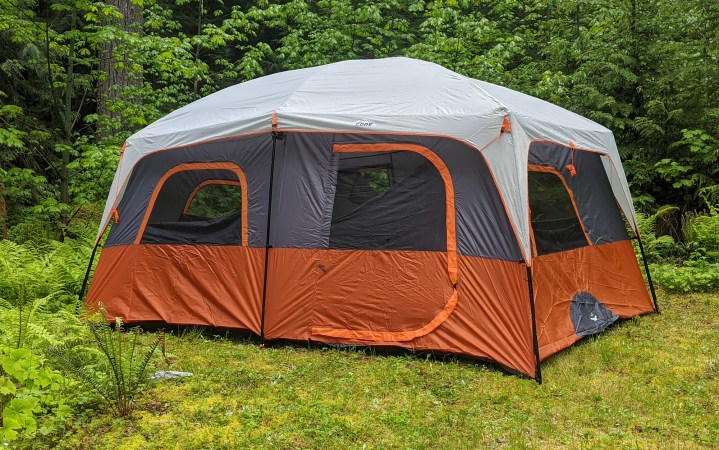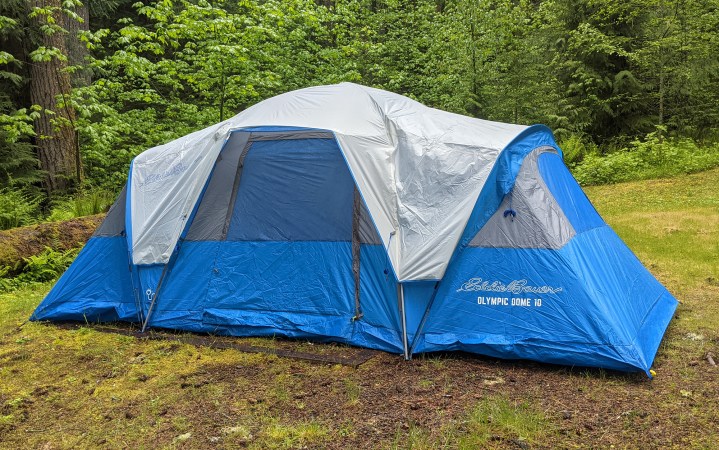We may earn revenue from the products available on this page and participate in affiliate programs. Learn More ›
Whether your family is growing or you’re simply looking for space to spread out, it’s becoming increasingly common to opt for a 10-person tent. These tents provide ample space for groups of four or more while still coming in at surprisingly affordable price points. But how hard is it to set up these tents, and do they offer the same level of protection? To find out, I called in five of the best 10-person tents and set them up side by side for a rainy Memorial Day weekend.
How I Tested the Best 10-Person Tents
It was a familiar scenario for anyone who has been camping in the Pacific Northwest. Reservations were made for a Memorial Day weekend group site months ago, but as the actual long weekend got closer, the forecast started to look bleak. Constant drizzle. Overnight lows in the thirties. No sunshine to speak of until Monday afternoon (naturally).
It was the perfect weather for testing car camping tents. Here’s a look at the contenders.
I arrived at the group site Friday midday to get everything set up. During that initial phase, I considered how intuitive (or not) the tents were to assemble, durability of the component parts, and the size and shape of the footprint.

Laura Lancaster
As family friends started to trickle in over the course of the evening and following morning, they started to claim various tents. By Saturday evening, every tent was filled. Over the rest of the weekend, my group provided feedback on how well the tents served their needs, and how well it protected them from the bad weather. At the end, I had each group take down the tent they had been sleeping in.
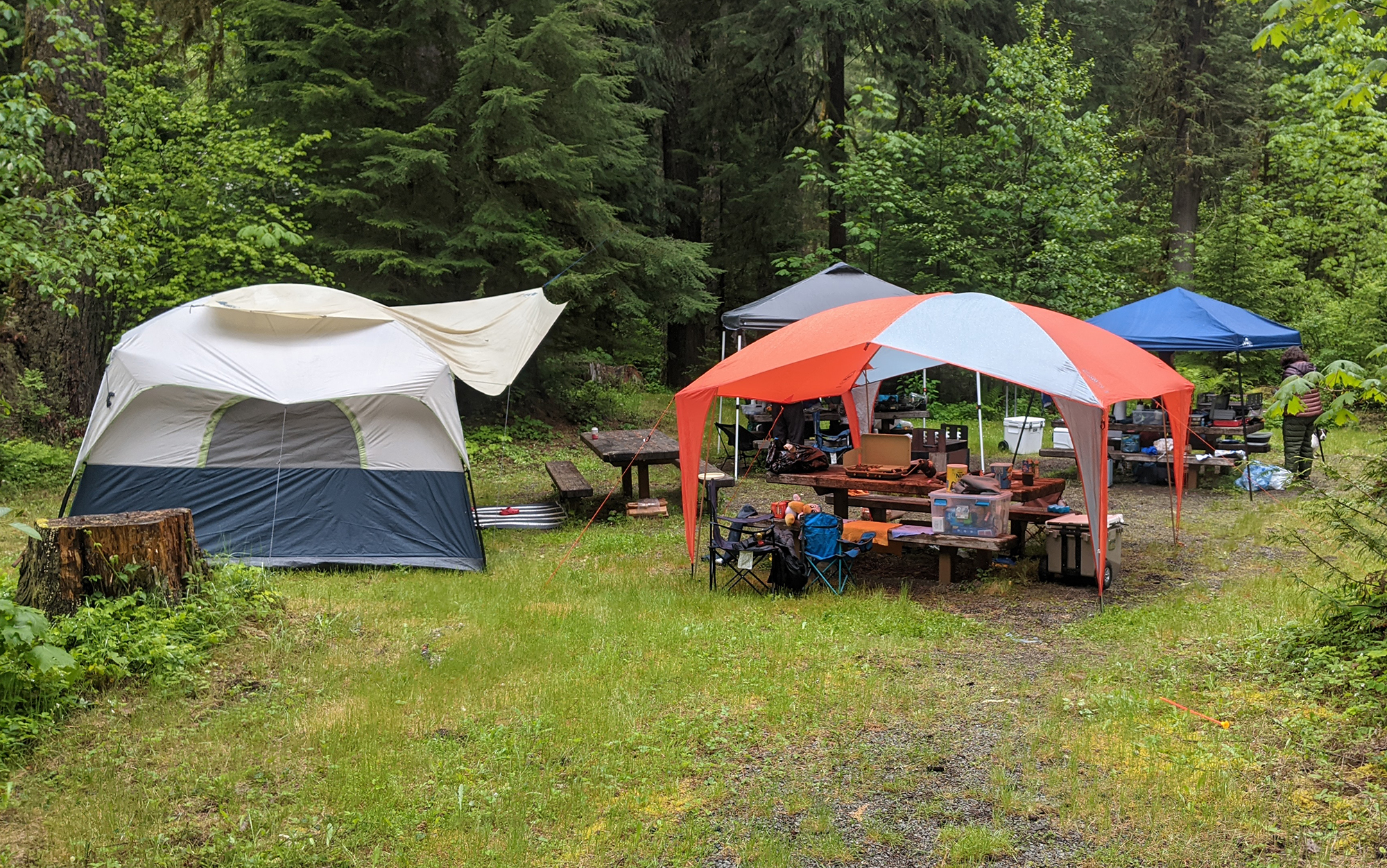
Laura Lancaster
In addition to packed size, assembled size, ease of set up, and weather protection, I also considered each tent’s price when making a final determination.
Best 10-Person Tents: Reviews & Recommendations
Best Overall: Wenzel Pinyon 10-Person Dome
Key Features
- Interior Dimensions: 18 x 10 feet
- Peak Height: 6.3 feet
- Doors: One
Pros
- Didn’t break during setup
- Didn’t leak during testing
- Reasonably priced
Cons
- Less headspace than other tents I looked at
The Wenzel Pinyon was the only 10-person tent in my test that didn’t break or leak in the rain, which makes it the only real winner in my test. This stemmed in large part from a lot of sensible decisions on the part of the tent designers. While this tent used fiberglass poles (like the others), they bent an appropriate amount when threaded through the sleeves before being held in place by simple pin mechanisms.
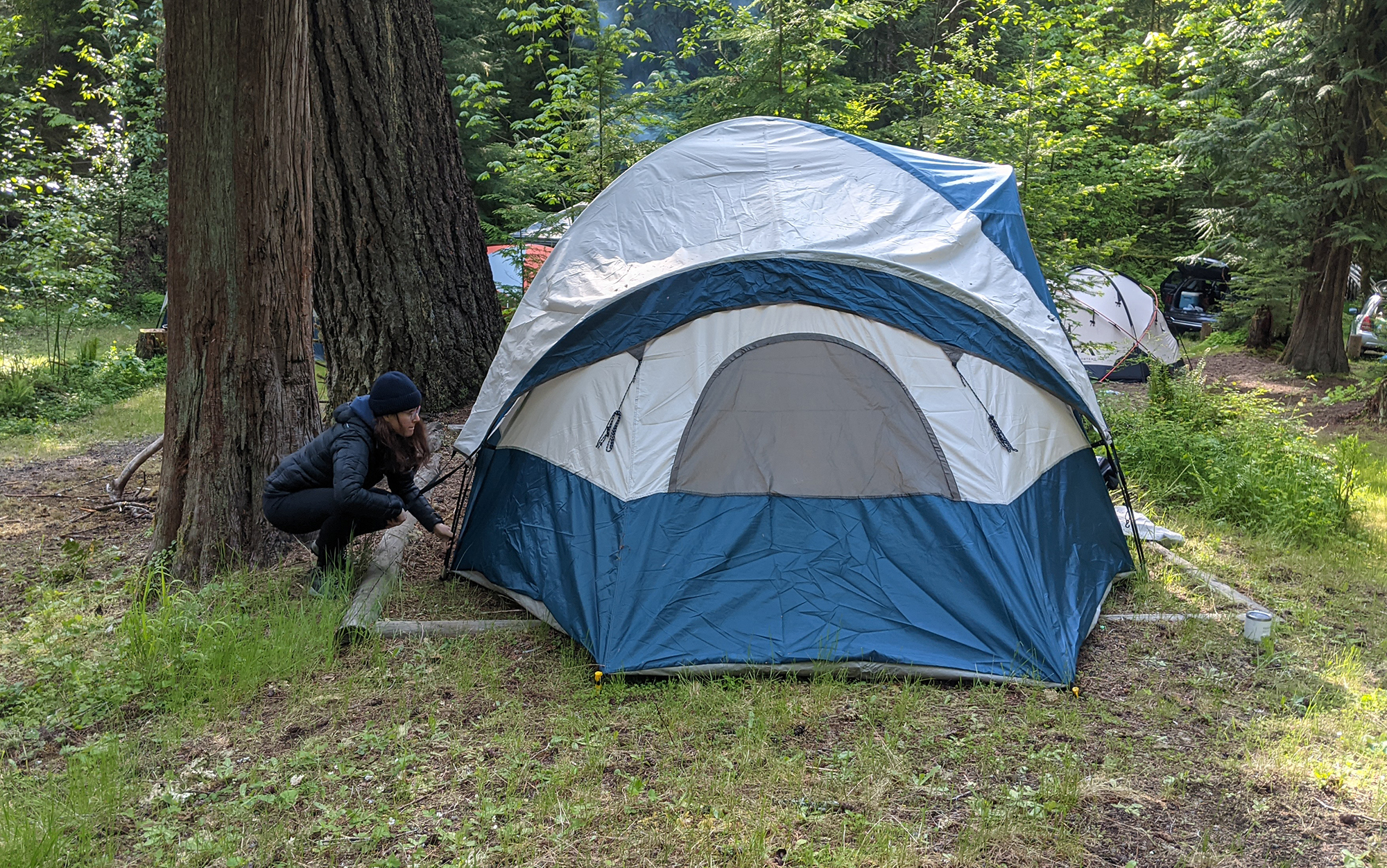
Laura Lancaster
The rainfly provided sufficient coverage, and there were a reasonable number of windows and doors, which also helps to prevent water incursion. There were even some different style stakes provided which hold better in soft ground (like we had around our testing site), a detail I appreciated.
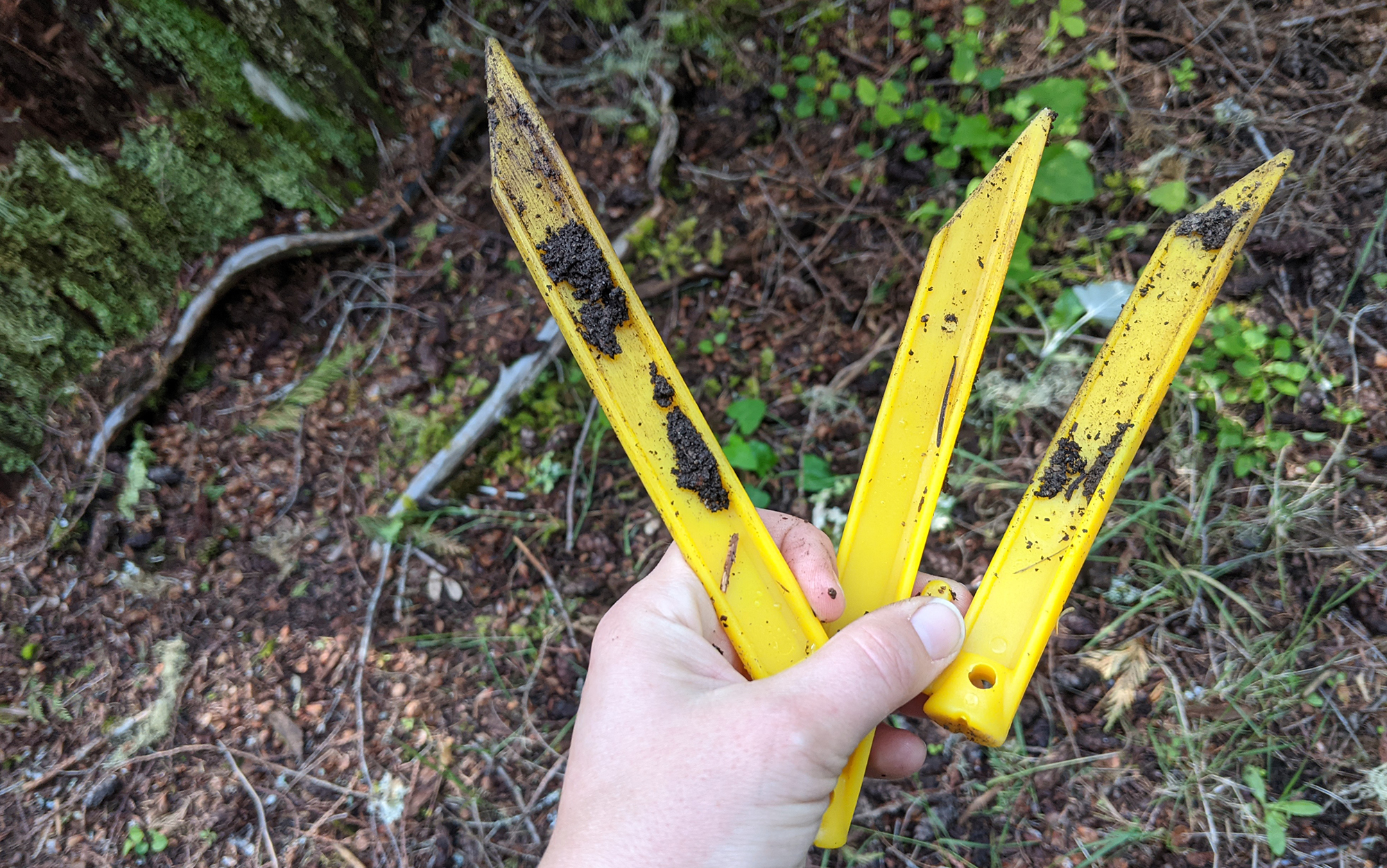
Laura Lancaster
The only downside to this tent is that because it had less headspace across the interior, it felt smaller even though the square footage was similar or even larger than other tents I looked at.
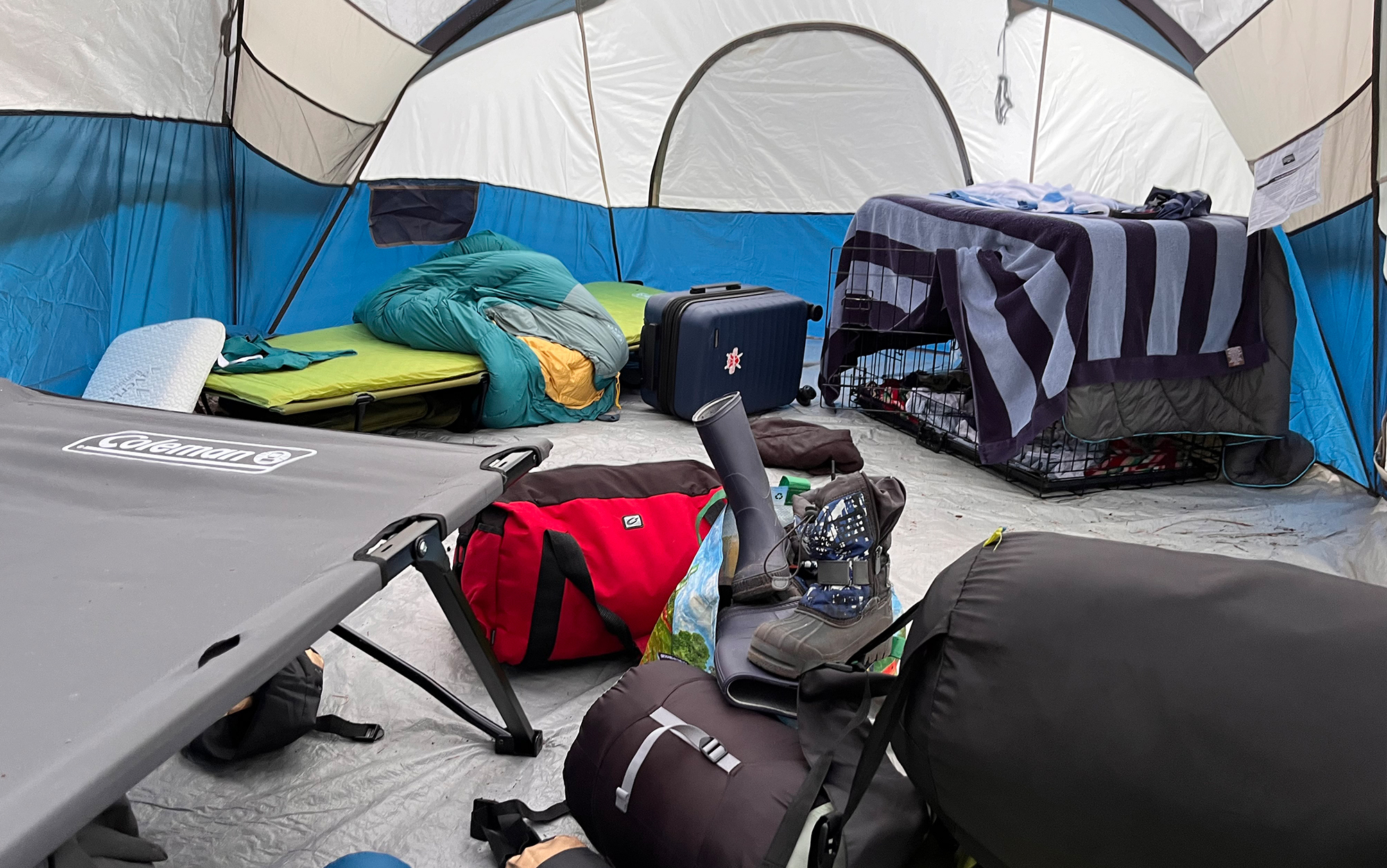
Laura Lancaster
But for the family that tested this tent (two adults, a preteen, and a dog) it was plenty big enough to spread out in with room to spare. They even asked if they could trade their typical family tent (a similar cabin style to the below models) for this tent at the conclusion of testing. That makes it a win in my books.
Best Budget: Ozark Trail Family Cabin Tent
Key Features
- Interior Dimensions: 14 x 10 feet
- Peak Height: 7.2 feet
- Doors: One
Pros
- Affordably priced
- Great head room
- Easier to maximize space in the interior than more elongated tents
Cons
- Windows leaked water overnight
- Difficult to set up
- Zippers tend to get stuck
Along with the Core 10-Person Straight Wall Cabin Tent, the Ozark Trail Family Cabin tent was one of the most difficult in my test to set up.
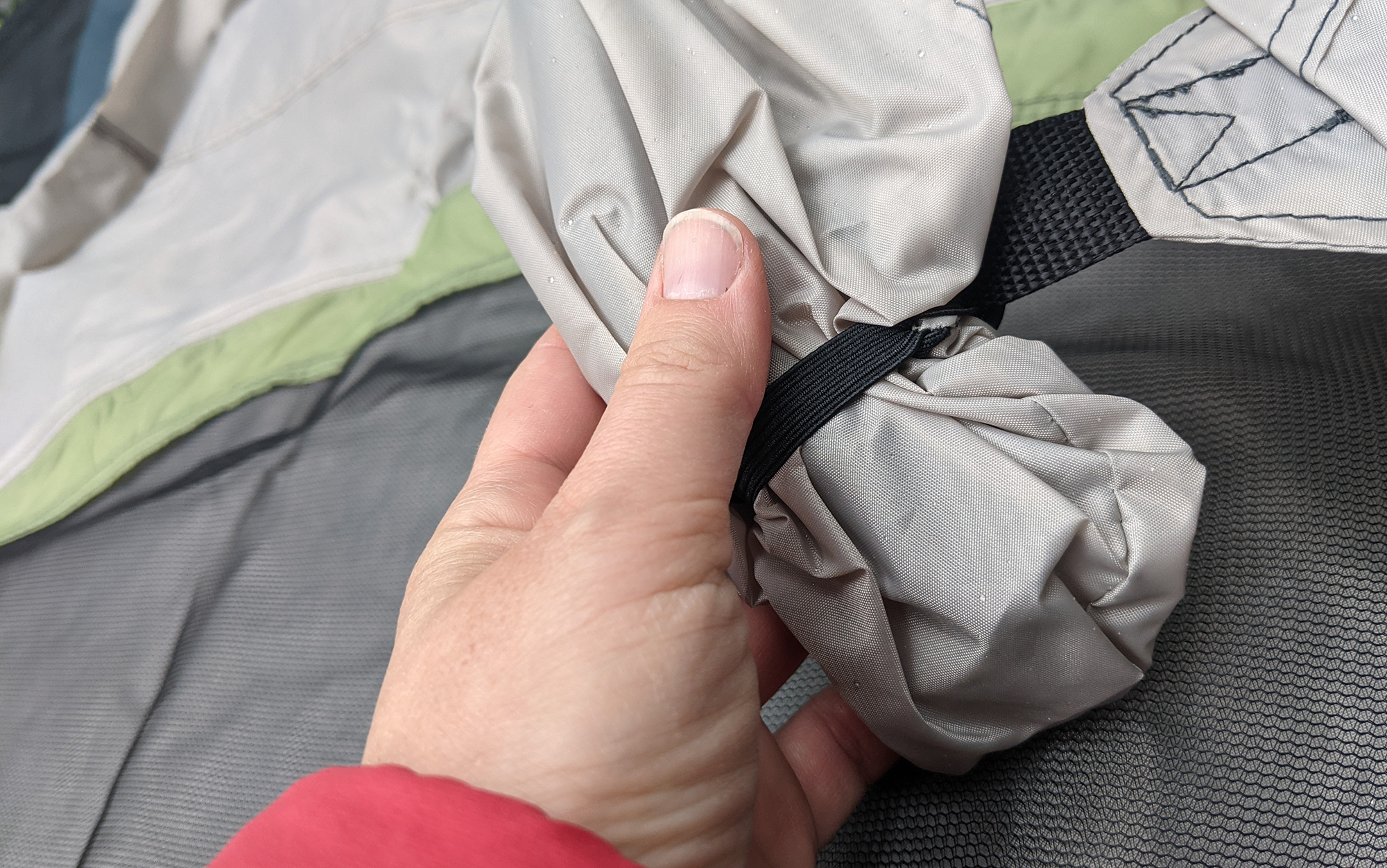
Laura Lancaster
There are three crisscrossing poles at the top that form the room of the tent. From there you bend down each end and connect the poles that form the side walls to the floor. In practice this took more elbow grease than I was expecting, to the point that I worried the fiberglass poles would break (they did not). This would have been easier with two people.
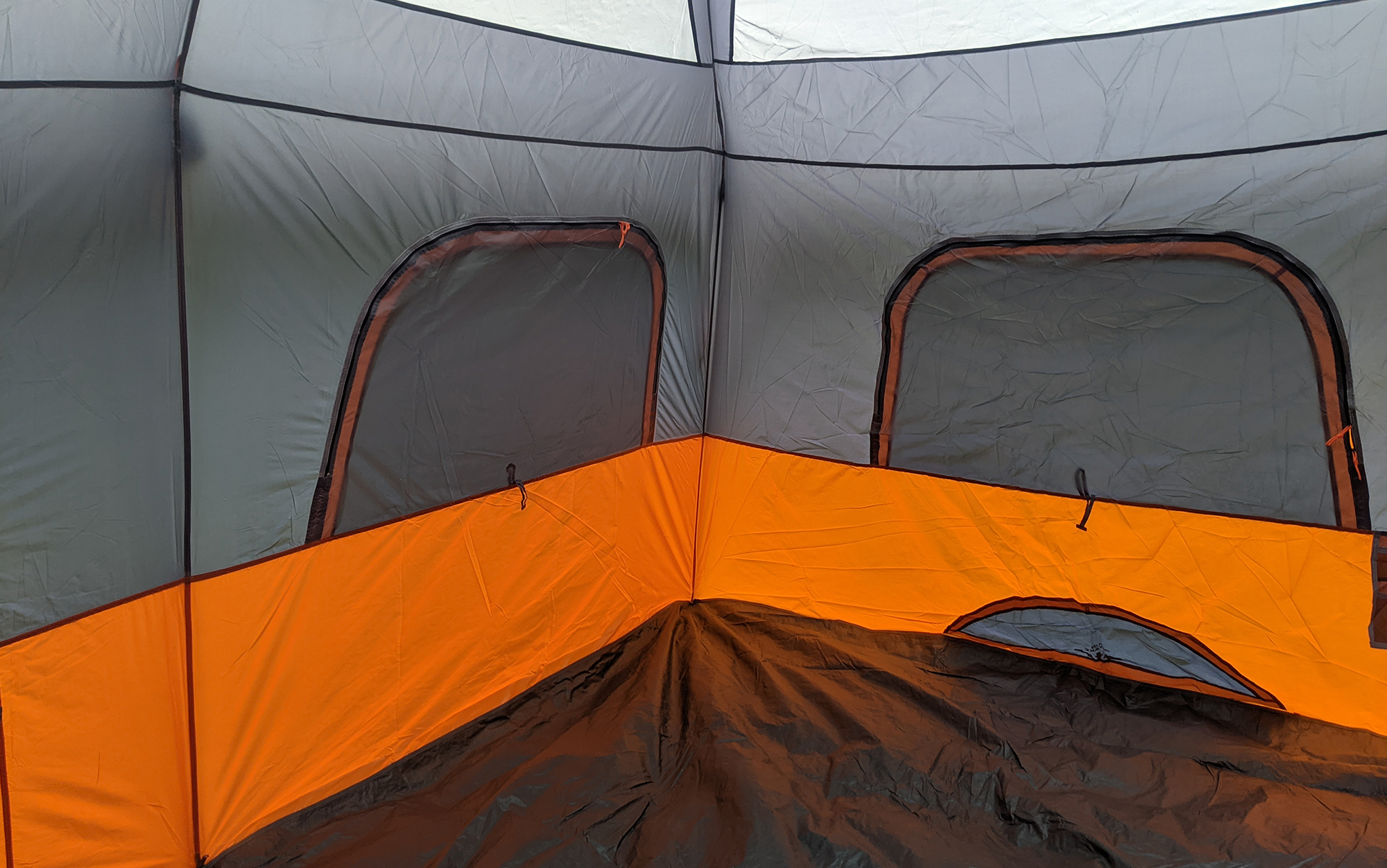
Laura Lancaster
Once the tent was up, however, it was easy to see that it had all been worth it. The height on this tent is impressive. Most taller individuals will be able to walk around the interior without needing to crouch. I also liked the shape of this tent, which was more square than others that I looked at. That gives you more flexibility with how you arrange sleeping situations. One of my testers noted, however, that there aren’t enough pockets on the inside to stash the odds and ends that crop up while camping.
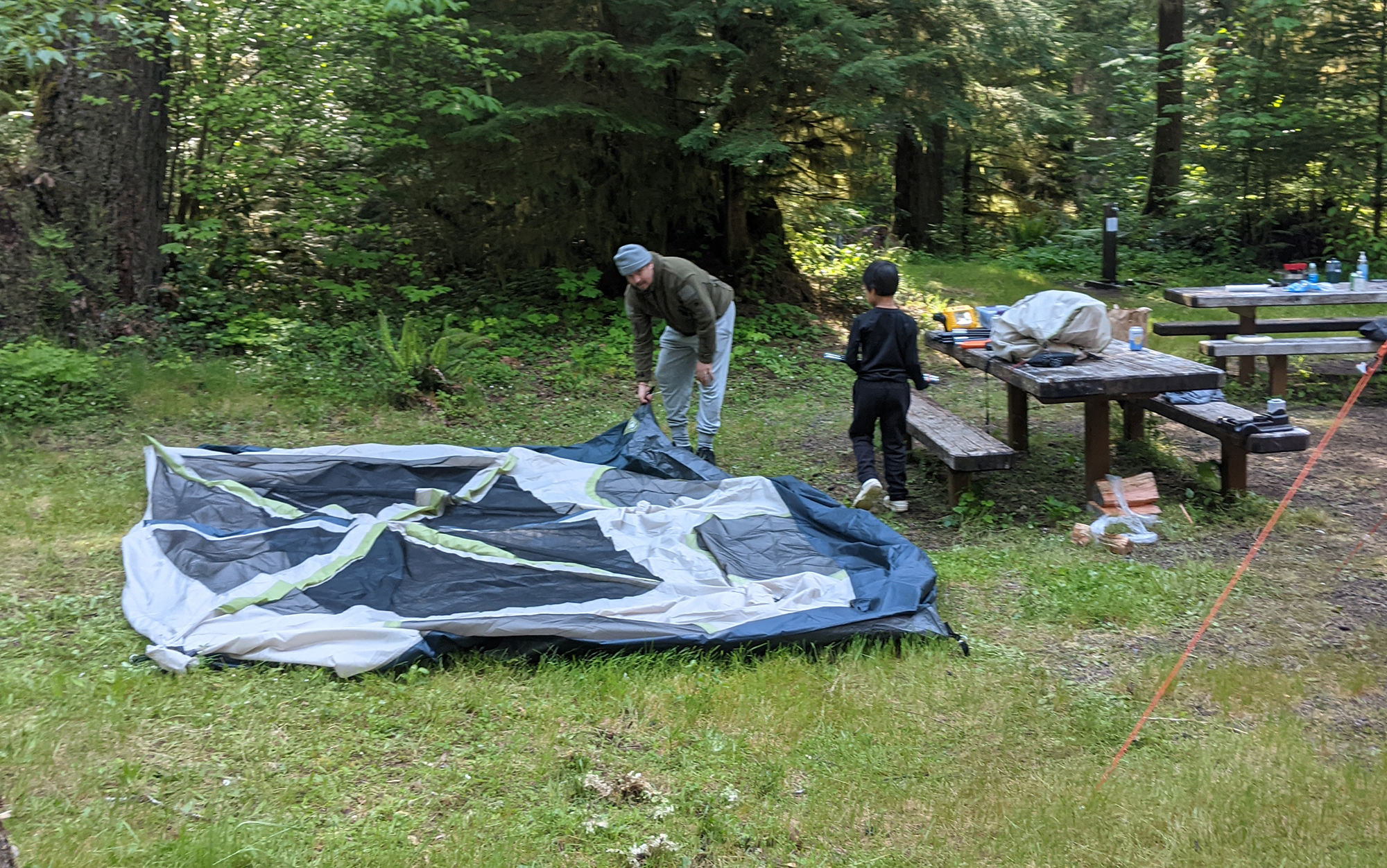
Laura Lancaster
Unfortunately, this tent was one of three that leaked during testing. The culprit in this case was the windows along the side. While they did seal up from the inside, water was still able to sneak in through the seams, and the tarp over the top of it didn’t provide enough coverage to protect it. Keep this tent in your arsenal for when you know there will be clear skies on your camping weekend.
Core 10-Person Straight Wall Cabin Tent
Key Features
- Interior Dimensions: 14 x 10 feet
- Peak Height: 7.2 feet
- Doors: One
Pros
- Great head room
- Easier to maximize space in the interior than more elongated tents
- Slightly longer warranty than the Ozark Trail equivalent
Cons
- More expensive than the Ozark Trail equivalent
- Windows leaked water overnight
- Difficult to set up
Despite having different looking carrying cases, it was clear during setup that the Core and Ozark Trail were the same tent, likely manufactured in the same facility. Every detail was exactly the same, just in a different colorway.

Laura Lancaster
If you find this tent on steep discount, go ahead and purchase; otherwise, save your money and pick up the Ozark Trail version.
Coleman Skydome 10-Person Camping Tent XL
Key Features
- Interior Dimensions: 16 x 9 feet
- Peak Height: 6.5 feet
- Doors: Two
Pros
- Two doors
- Not too bad to put up by yourself
- Stayed dry overnight
Cons
- Attachment point for one of the poles broke during setup
- Expensive
A lot of people struggle with setting up tents. Even if you’re well versed with the classic criss cross style of most modern camping and backpacking tents, the structural needs of a 10-person tent can get pretty intense. So I understand why Coleman tried to simplify it by attaching their poles at one end of each tent. There were a few problems with this, however. The smaller of the two problems is that this makes breakdown more of a hassle than it needs to be. You can’t simply fold up the poles separately and do whatever you need to do with a sopping wet rain fly and tent body.

Laura Lancaster
I typically haphazardly roll it and then end up doing a lot of stuffing. But with this tent, you have to neatly fold the pole inside the tent body to have a hope of getting the whole thing back in the carrying sack. But the bigger issue is that one of the plastic pieces that holds the pole into place on one side broke.
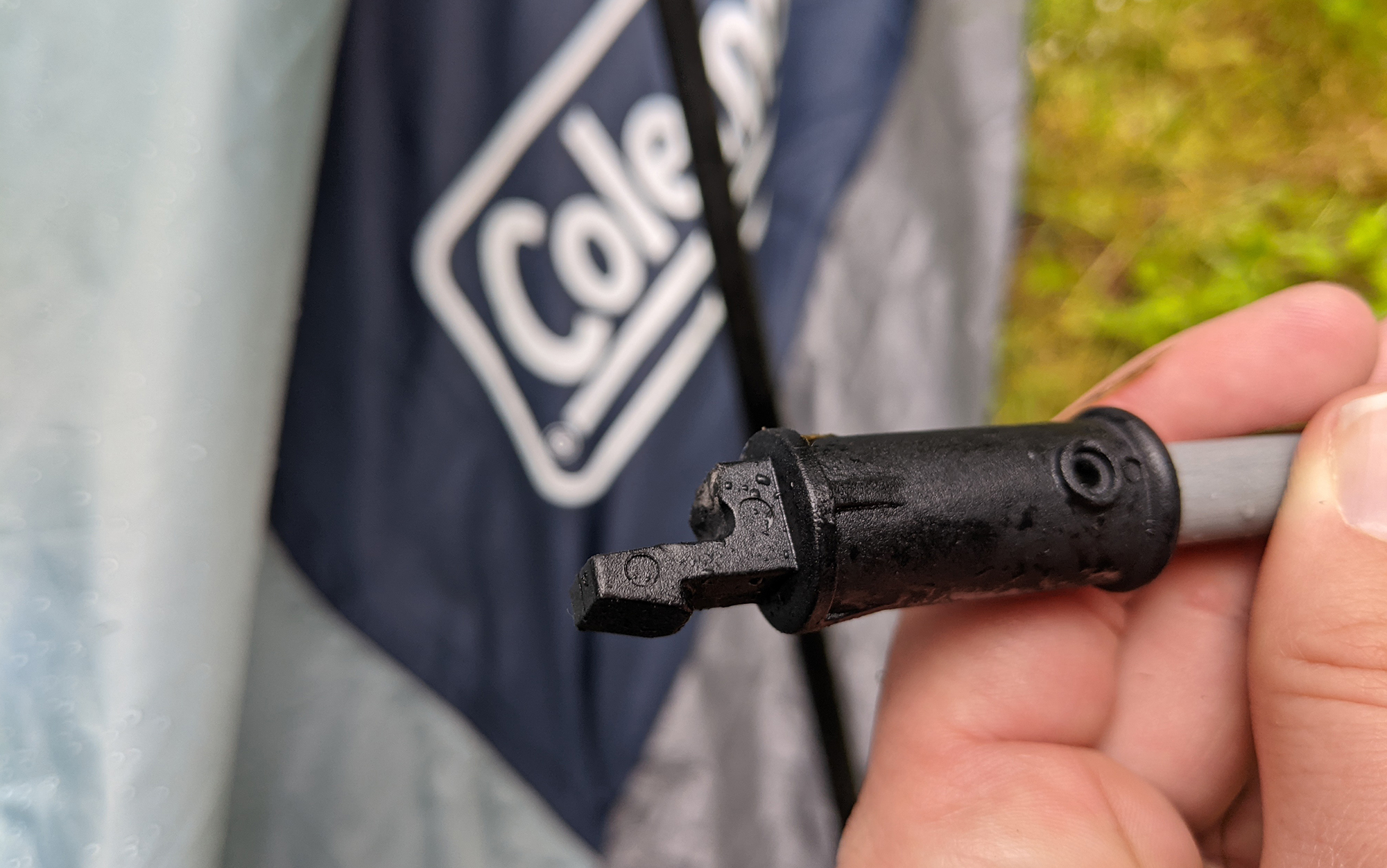
Laura Lancaster
I was still able to set the tent up, but it was ultimately a little disappointing. A simple grommet system wouldn’t have been this delicate. And I typically find that color coding the poles and the connection points and sleeves is the easiest way to communicate what goes where.
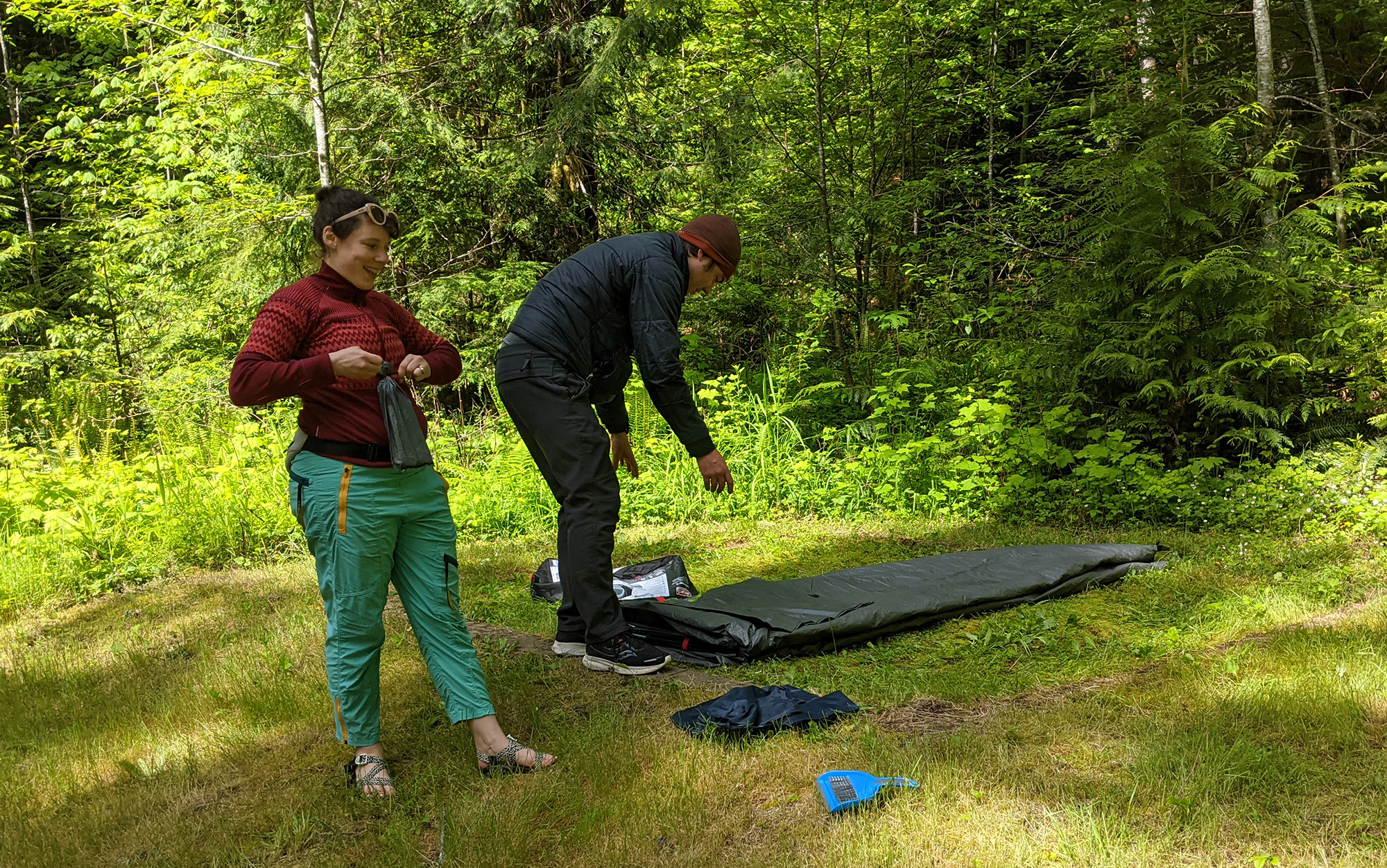
Laura Lancaster
Beyond this breakage, however, the Skydome ended up being a pretty serviceable tent. It was one of the few that didn’t have rain incursion overnight. And it was surprisingly dark on the interior, so much so that the couple who slept in it managed to stay asleep until nearly eleven on the second day of camping.
Eddie Bauer Olympic Dome 10 Multi Room Tent
Key Features
- Interior Dimensions: 18 x 8 feet, 8 x 5 feet back room
- Peak Height: 6.5 feet
- Doors: One
Pros
- Spacious with a unique design
- Great directions attached to the interior of the bag
Cons
- Leaks out the back window if not staked out
- Pole bent during testing
- Expensive
I had high hopes for the Eddie Bauer Olympic Dome, but unfortunately this tent did not live up to my expectations. It started off well with some unusually excellent directions, which I appreciated having just come from the Coleman tent and its attached poles.
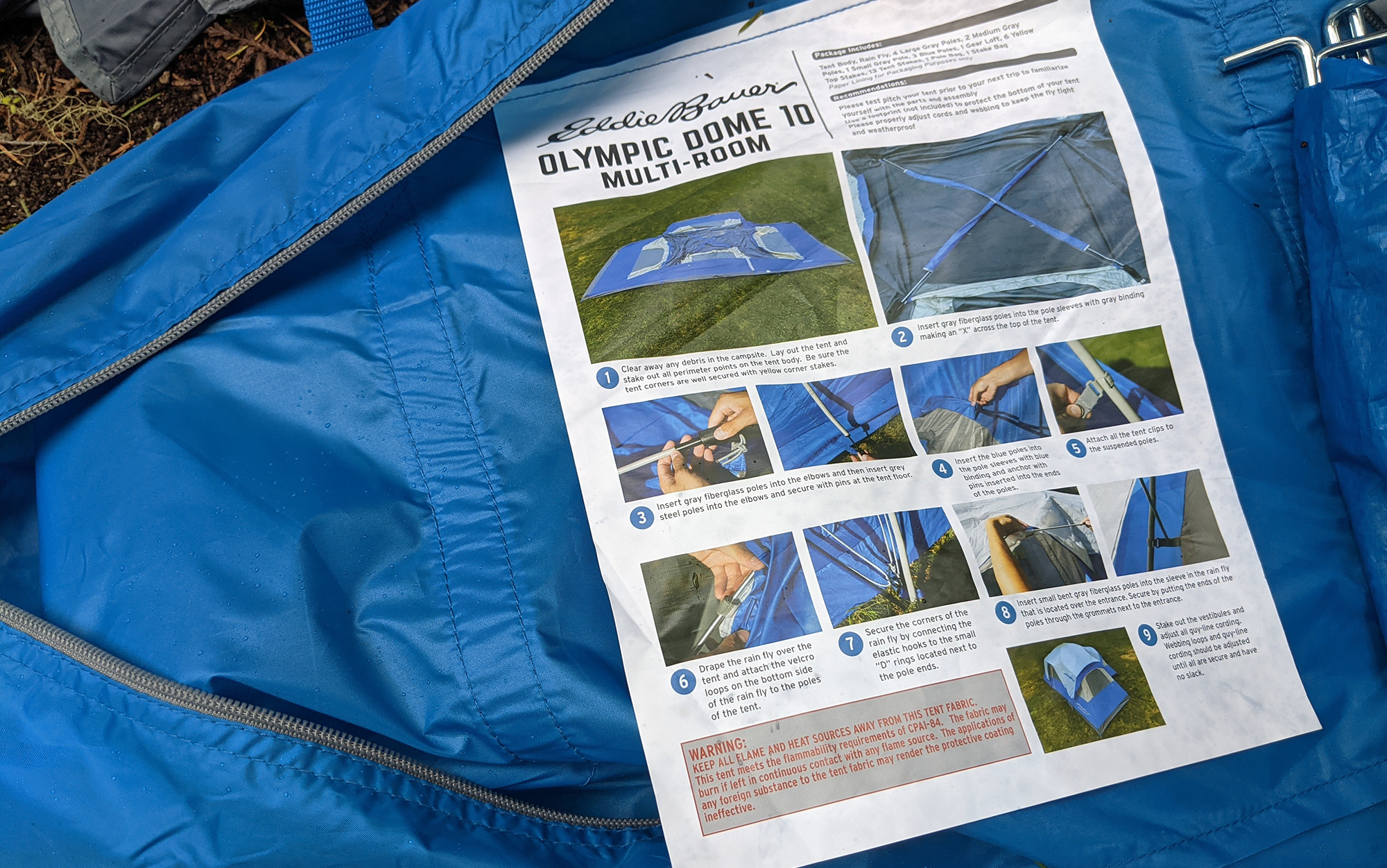
Laura Lancaster
Unfortunately — and inexplicably — one of the steel support poles bent while I was assembling the tent. This was a surprising result (I’m not that strong) and suggests that the materials used to create this tent are not especially good quality, despite the higher price point of this tent.
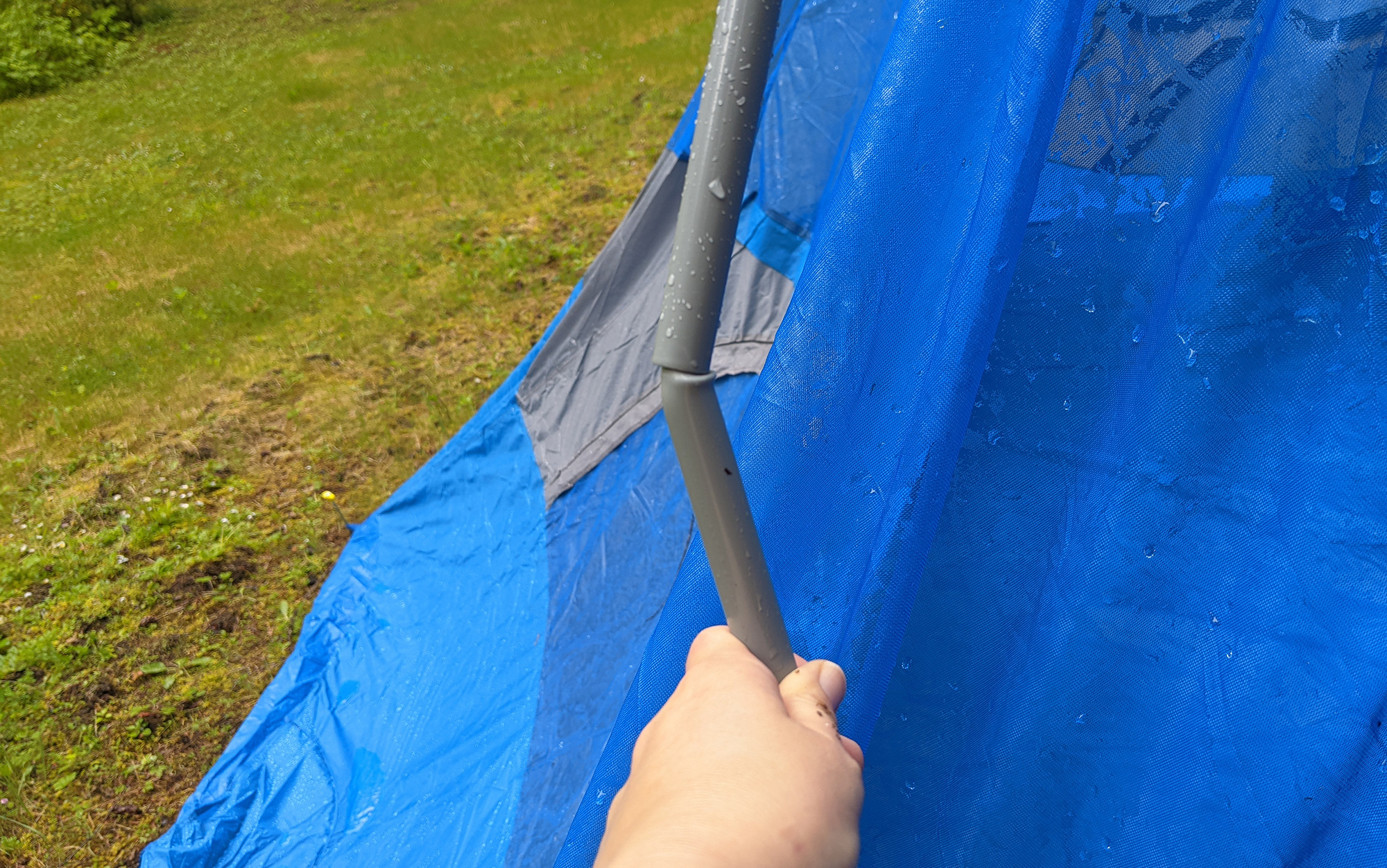
Laura Lancaster
Even though the pole was bent, I finished setting up the tent and got the rainfly over the top. The inside was nice and spacious and I appreciated the blue ambience on what was otherwise a strangely dark and gloomy day for late May.
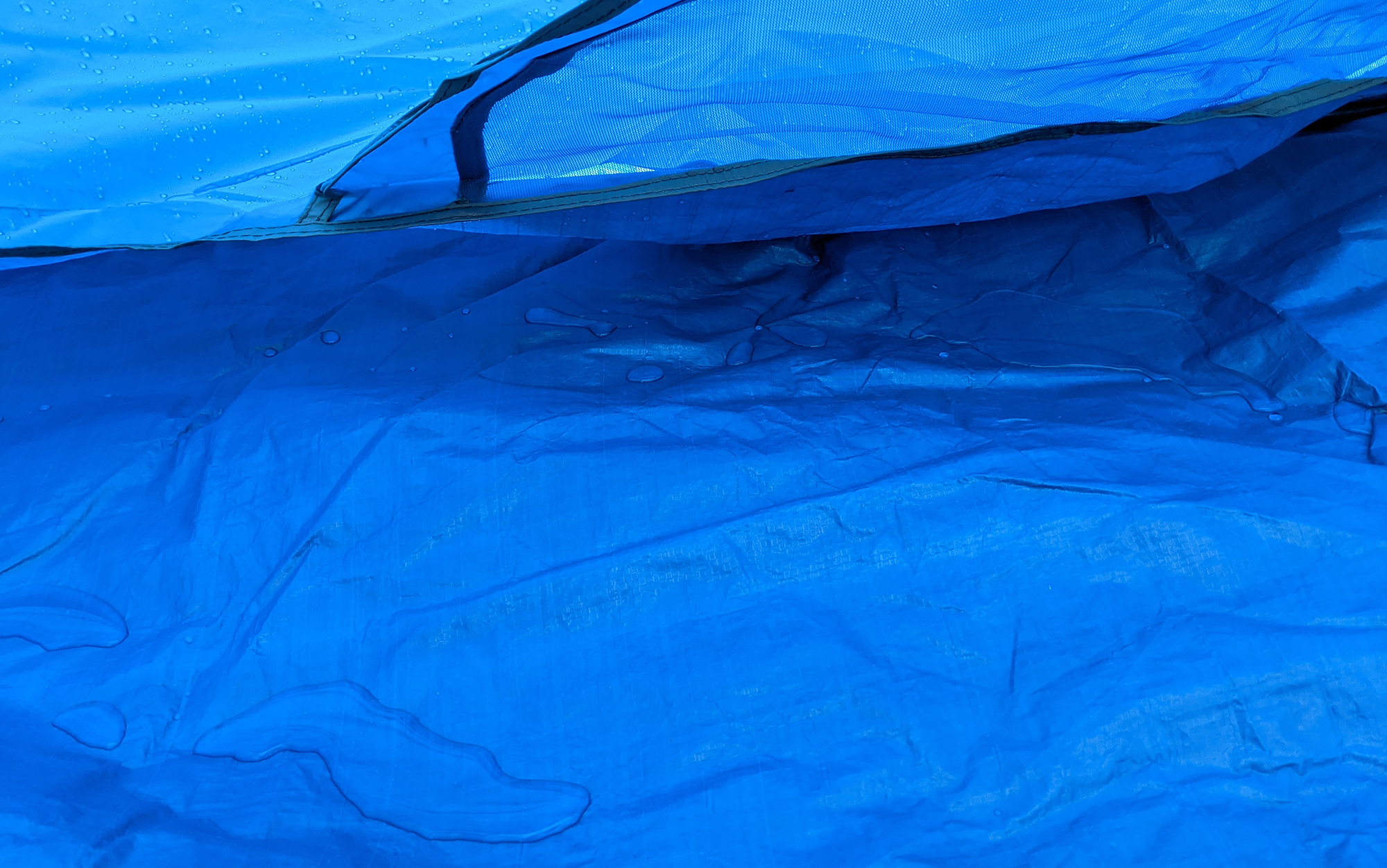
Laura Lancaster
After the first night, a puddle had formed near the back of the tent. Upon further examination, it appeared that this was the result of the awning for the back window not being taut — it needed to have its guyline staked out. The individual who slept in this tent shared that she simply stayed away from that side to avoid dealing with the rain creeping in.
Things to Consider Before Buying a 10-Person Tent
Do you need a 10-person tent?
Overall, I was pretty disappointed with the quality of the 10-person tents that I looked at. Several broke. More had water leak in overnight. All were made from less robust materials, including fiberglass poles. This helps to keep the cost of the product down but makes for a less reliable product in the long run. Which is a real problem when you’re talking about your shelter. If you can, I’d recommend opting for one of the best 6-person tents or one of the best 8-person tents.
Height
In the end, with much perseverance, I was able to put up every one of these 10-person tents by myself. All 5-foot-5 of me. But it was a real bear with the two cabin style tents, simply because they were so much taller than everything else. If you’re on the shorter side, I’d recommend choosing a tent that is likewise a little bit shorter to help streamline the setup process.
Ten-person tents, as you might guess, are huge. If you expect there to be limitations to how much space you’ll have to set up your tent, it’s better to opt for something smaller. None of these came close to fitting on a standard tent pad, which is increasingly a requirement at the most popular campgrounds.
FAQs
Ten-person tents will comfortably fit six people, but are becoming increasingly popular for families of four looking for plenty of floor space to spread out.
Ten-person tents are harder to put up than smaller tents. Plan to bring along the directions if this is your first time setting one up. Better yet, test it out in your backyard before heading out.
You can easily fit two queen-sized air mattresses inside of a 10-person tent, or six twin-sized camping mattresses.
Bigger tents offer more headroom, and more space for families to spread out. On the other hand, they are more difficult to set up, and they take up more space. In my tests, the best 6-person tents still fit comfortably on tent pads at most campgrounds. Larger tents, including the best 8-person tents and the best 10-person tents do not.
Read Next: The Best Family Tents
Final Thoughts
Ultimately, I wasn’t as impressed by the 10-person tents that I tested for this story as I was by the 8-person tents or the 6-person tents. There were a lot of tarp floors, and a lot of fiberglass poles. Unless you truly need this much space, I would strongly recommend you opt for something smaller made with higher quality nylon and steel poles. But if you have a big family then a 10-person tent can absolutely be a cozy way to enjoy the long weekend. Here are my recommendations.
syndication@recurrent.io (Laura Lancaster)
 Healthy Famz Healthy Family News essential tips for a healthy family. Explore practical advice to keep your family happy and healthy.
Healthy Famz Healthy Family News essential tips for a healthy family. Explore practical advice to keep your family happy and healthy.



